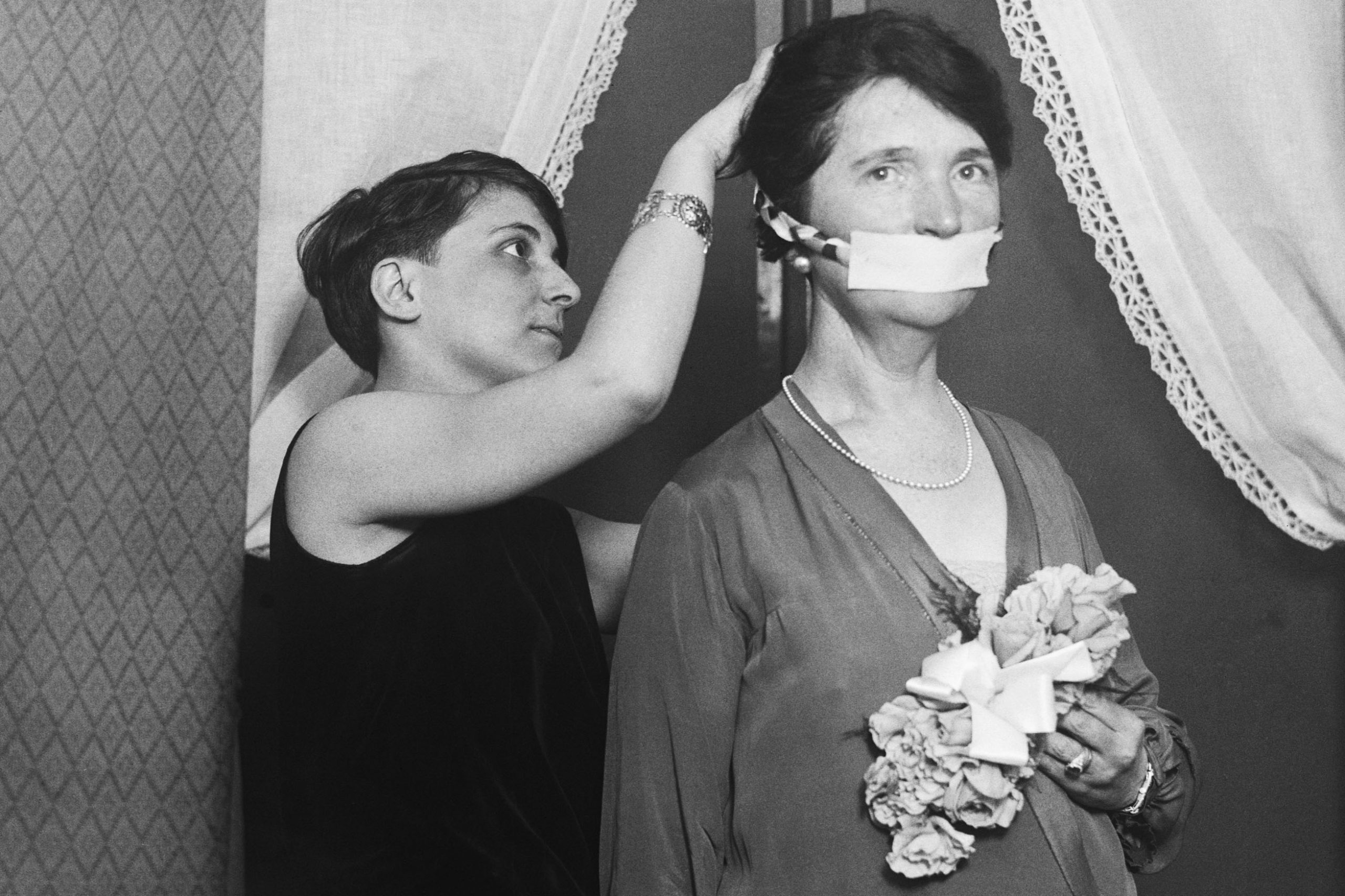The socialist pioneers of birth control
When birth control was still taboo, socialists fought to make it accessible to working-class women, recognising women’s emancipation as at the heart of the fight for a better world.
Author:
22 August 2019

A recent New Yorker comic managed to convey some political truth. In “Nineteenth-Century Novels, with Better Birth Control,” Glynnis Fawkes reimagines Victorian plots with modern advances in reproductive medicine. “How could I be dead from childbirth,” Cathy Earnshaw cries in the updated Wuthering Heights, “when I was never pregnant?”
The contemporary assault on reproductive rights in America is anything but a laughing matter. Some states are down to just one abortion clinic. But the comic does get something unmistakably right: up through the mid-19th century, birth control was such a taboo that even the wildest imaginations of the brightest authors could not conceive of its widespread use. It was left to those dreamers who, while struggling for the emancipation of humanity writ large, struggled for women’s self-determination and bodily autonomy – namely, socialists.
Taking up an issue that was far outside the mainstream, socialist pioneers in countries like Britain, the United States and Germany argued that access to birth control had to be understood in class terms and that women’s emancipation was at the heart of the fight for a better world. Those who broke ground were sent to jail and traduced in the press, disparaged as vulgarians and treated to withering misogyny. But they all stand as testaments to the radical origins of the birth control movement.
Britain’s Annie Besant
Even before the term itself existed, birth control took centre stage in the debate about economic inequality in Britain. Annie Besant, an early socialist whose Irish parents fled the famine, saw birth control as a means to build solidarity and curb inequality. She broke the taboo against speaking publicly about sexual matters and challenged the anti-poor nostrums peddled by overpopulation fearmongers. She wrote movingly: “Some say that it must be so, that the palace and the slum will forever exist as the light and the shadow. Not so do I believe. I believe that poverty is the result of ignorance and bad social arrangements and that therefore it may be eradicated by knowledge and by social change.”
In 1877, seeking to free the birth control cause from the shackles of enforced silence, Besant published Charles Knowlton’s Fruits of Philosophy, one of the first modern works to detail contraceptive methods. The subsequent obscenity trial attracted international attention and came at considerable personal cost to Besant. Her husband, Reverend Frank Besant, tarnished her as an immoral, unfit mother. So profound was the misogyny of the time that in the court case, Besant was referred to as “another person”. Her performance in the courtroom, however, was riveting: “We think it more moral,” she declared, “to prevent conception of children than, after they are born, to murder them by want of food, air and clothing.” While Besant won her obscenity case, she lost guardianship of her children.
Related article:
Besant was a socialist through and through. “The greatest orator in England,” according to George Bernard Shaw, she played a major role in reviving radicalism after the decline of the mid-century Chartists. She joined the Fabian Society’s executive committee and oversaw as organiser the very successful distribution of the 1889 Fabian Essays in Socialism. Besant was also affiliated with the more Marxist Social Democratic Federation of Great Britain, a fledgling socialist party. One observer claimed that Besant “probably knew the views of the working classes better than all the other leading socialists of her day put together”. And, as the country’s first major figure to publicly endorse birth control, she was also one of the first socialist thinkers to count housework and childcare as part of the labour both for which women should be rewarded and from which they should be freed.
Related article:
One year after the publication of her 1886 works Why I am a Socialist and Modern Socialism, Besant led a procession of East End workers that culminated in violent clashes at Trafalgar Square. The 13 November 1887 riots, which became known as “Bloody Sunday”, were galvanised by outrage at oppression in Ireland and widespread economic deprivation in London. One year later, she again played an important leadership role in a bottom-up struggle, this time London’s matchgirls’ strike, the first successful walkout of non-unionised workers in the country. The young female workers were not only woefully underpaid but exposed to poisonous phosphorus on the job. Besant was key to the subsequent establishment of the Matchmakers Union, the first of its kind to exclusively represent women workers, and was active in the 1890 London dock strike.
Her advocacy of reproductive rights, women’s suffrage and labour struggles formed part of a broad-based programme of emancipation – one that galvanised the UK’s burgeoning socialist movement.
Margaret Sanger
Across the ocean a couple decades later, another socialist of Irish parentage, Margaret Sanger, went beyond even the championing of condoms or the counsel of the sponge. Working in a similarly urban district of “undesirable” migrants and economic refugees in the east end of Brooklyn in Brownsville, Sanger opened the United States’ first birth control clinic in 1916. Like Besant, she had behind her years of socialist agitation and revolutionary solidarity. Energised by the direct action tactics of the Industrial Workers of the World (IWW), Sanger had helped lead the 1912 Lawrence textile worker strike and the 1913 Paterson silk workers strike, where she organised alongside Jessie Ashley, a socialist feminist and pioneer in the struggle for birth control.
Before opening the clinic, Sanger put out eight issues of the feminist magazine The Woman Rebel, emblazoned with the motto “No Gods, No Masters” and brimming with articles about sex education, abortion and the array of injustices that capitalism inflicted upon women. Her first birth control pamphlet, Family Limitation, explained contraceptive methods and included the formula for an abortifacient. In an accompanying letter with instructions, she noted her audience: “Poor working men and women who are overburdened with large families . . . thousands of women in the cotton states bearing 12 to 16 children . . . Thousands of women facing the tortures of abortion . . . Three hundred thousand mothers who lose their babies every year from poverty and neglect.”
If Besant was tarred in the press as “indecent, lewd and filthy”, so Sanger was labelled a purveyor of “vulgar and sensational propaganda”. In 1914, she was hit with obscenity charges. She continued to rail against the injustice of “motherhood in bondage”. No longer, she asserted, should women be treated as “a brood animal for the masculine civilisations of the world”.
Related article:
In addition to her work with the IWW, Sanger was involved with the Socialist Party (SP) – serving as an organiser of the party’s women’s commission and writing for its daily, the New York Call. In 1912, at the peak of the SP’s clout, Sanger supported the socialist presidential candidate Eugene Debs.
No other party fought as consistently for women’s rights, and almost all leading supporters of birth control were socialists of one stripe or another. The best in the party saw birth control as a crucial demand, a boon for self-determination that would alter power relations in favour of women. Access and education would improve the lives of the poor immediately while countering conditions that led to the subjugation of half of the worker movement’s potential constituency.
After World War I, the terror of the Red Scare pushed Sanger away from the socialists and into the arms of middle-class progressive reformers. It was here that she became associated with a more popular cause at the time: eugenics. Lacking an organic base in the working class, the progressive projects of immigrant assimilation and social betterment took them into noxious territory: “improving the genetic base” through legal social coercion and top-down control. Even though Sanger saw “selective breeding” as a voluntary option and certainly never embraced any racialised variant, her later views are rightly criticised today.
Still, we shouldn’t forget the enormous bravery she displayed in fighting for basic reproductive rights. At the time Sanger opened her first clinic in 1916, it was illegal in the United States for doctors to even discuss contraception with one another by mail. Disclosing to someone where information on birth control could be found was legally verboten. Sanger pushed on. Inspired by her work with the IWW – and possibly the tutelage of Emma Goldman, who smuggled in contraceptive devices from Europe – Sanger moved from the minimum demand for information to the direct action of opening a clinic.
Related article:
On 9 October 1916, 140 visitors from the largely Jewish and Italian neighborhood lined up on the clinic’s first day. Aided by her sister, a Yiddish translator, and neighbourhood donations of tea and doughnuts, Sanger’s clinic had 464 case histories on file after just nine days. But within two weeks, the clinic had been shuttered, the victim of an undercover sting operation. Sanger and others were sentenced to 30 days in jail. The trial featured numerous testimonials from the women Sanger had helped:
“Have you ever seen Mrs. Sanger before?”
“Yes. Yes, I know Mrs Sanger.”
“Where did you see her?”
“At the cleenic [sic].”
“Why did you go there?”
“To have her stop the babies.”
And
“How many children have you?”
“Eight and three that didn’t live.”
The German socialists
“There can be no emancipation of humanity,” the German socialist August Bebel wrote in his 1904 book Woman and Socialism, “without the social independence and equality of the sexes.” In the same work, he argued that women’s struggle for reproductive control stemmed from a deeper wellspring of consciousness that had yet to be recognised.
Bebel’s feminist writings were not an anomaly. From its conception, the German Social Democrats (SPD) – the world’s first mass democratic socialist party – opposed the country’s criminalisation of birth control, which prescribed “penal servitude” for those who practiced (as well as those who aided) reproductive control. The SPD saw this as a class issue: while hundreds of working-class women were imprisoned, the wealthy could easily skate by, accessing numerous workarounds by dint of their privilege.
By World War I, a number of pioneering birth-control organisations had arisen in Germany, inspired by and affiliated with the “big tent” democratic socialist movement. In 1911, the first international conference for birth control was convened in Dresden. In 1913, a number of social democratic doctors came together to found the “Union of Socialist Doctors”, arguing that doctors should be natural advocates of the poor. The organisation took as foundational the struggle to decriminalise birth control and produced an impressive body of thought on the matter. Others stepped in as well, flouting the ban on birth-control advertising: the pharmacist Paul Heiser formed the “Workers Association for Birth Control”, where he sold independently made birth control products. In 1913, one year before the catastrophic outbreak of World War I, the maverick socialist Julian Moses even called for a working-class “birth strike” to withhold “cannon fodder” and a “reserve army of labour” for the capitalist class.
Related article:
With the acrimony between social democrats and communists intensifying following World War I, birth control proved a rare field of cooperation. The Union of Socialist Physicians maintained communist as well as social democratic members, and the theme of its 1928 national convention was “Birth Control and Socialism”. Most of the leading voices in the League of German Women Doctors were also members of the socialist union. Founded that same year was the National League for Birth Control and Sexual Hygiene. A lay organisation, largely social democratic in orientation, it argued for birth control as necessary for the survival of the working class. The organisation had hundreds of local branches that provided counselling services, including mobile units to reach non-urban areas and those with the least access to birth control.
Germany was the first country to expand Sanger’s birth-control clinic model into a wider network. Under the auspices of the German Committee for Birth Control – and made possible by an alliance of social democratic health insurance officials and communist municipal representatives – Berlin set up seven birth-control clinics, all embedded in the national health-insurance system. By 1928, the Committee for Birth Control was able to organise what may have been the first-ever doctors’ course on birth control.
The groundwork had been laid by an active working-class movement going back decades. Braving opposition from the reactionary political establishment and conservative medical community, socialist doctors and lay activists converged on the urgent need for both self-help and safety as essential for the health, survival and political independence of women.
Freedom for all
A century later, in our current moment, right-wing movements globally seek to undermine contraceptive access and limit women’s sovereignty just as they seek to strip voting rights and civil liberties. In the United States, the most basic access to reproductive services is under existential threat. If some elites had their way, the fate of a fetus – neither a person nor possessed of self-determination – would trump the rights of a pregnant person. A woman could land in prison for having a miscarriage or for being the victim of a gunshot wound.
It’s vital, then, to recall that the issue of reproductive rights has always been embedded in a political struggle, and that the equality and emancipation of women has been bound up with the freedom and equality of all. It was championed originally, and most forcefully, by the movement for democratic socialism. And for socialists today, it’s our duty to reenergise our historic role in the struggle for bodily autonomy – because any renewed subjugation of women portends the graveyard of unfreedom for all.
This is a lightly edited article originally published in Jacobin





